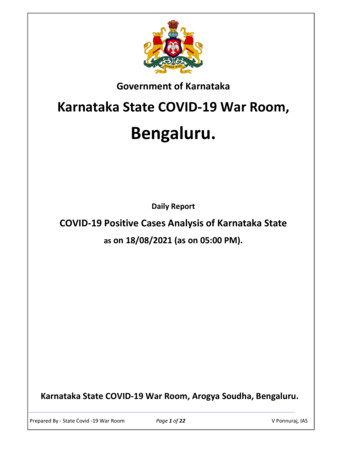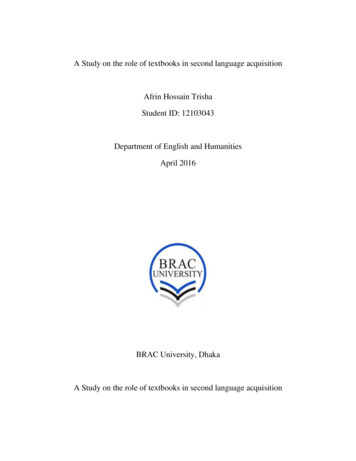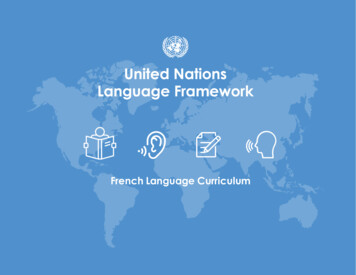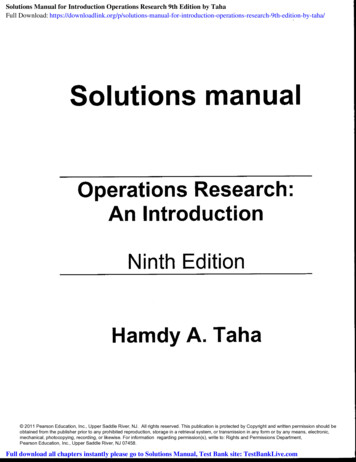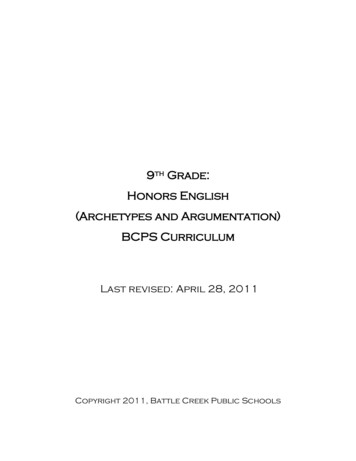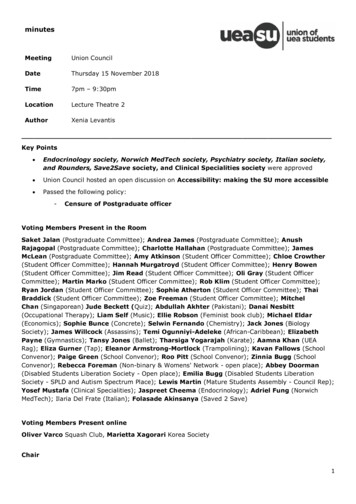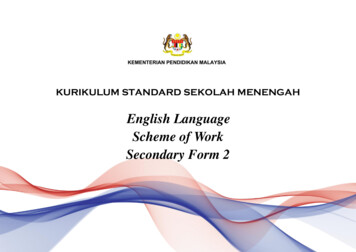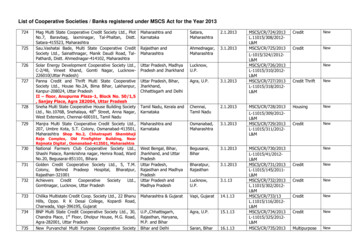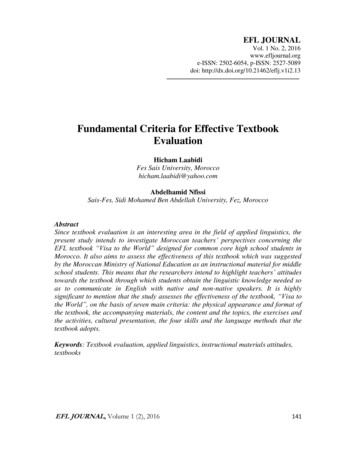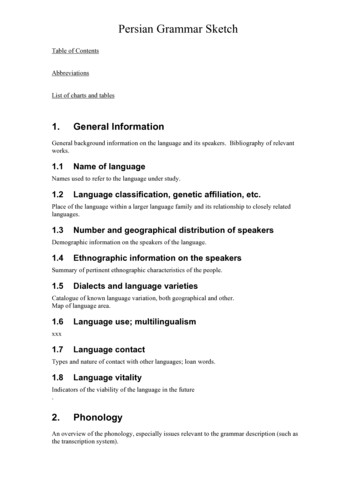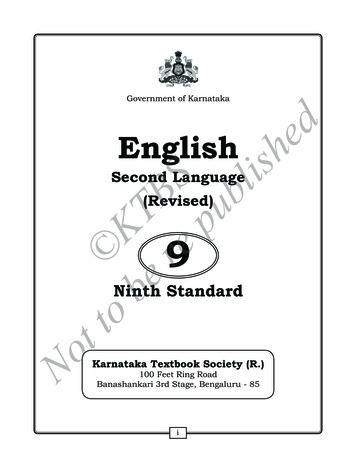
Transcription
Kbe TBre SpublishedGovernment of KarnatakaEnglishSecond Language (Revised)9NottoNinth StandardKarnataka Textbook Society (R.)100 Feet Ring RoadBanashankari 3rd Stage, Bengaluru - 85i
PREFACEKbe TBre SpublishedThe Textbook Society, Karnataka has been engaged in producingnew textbooks, according to the new syllabi ,which in turn aredesigned on NCF - 2005, since June 2010. Textbooks are preparedin 12 languages; seven of them serve as the media of instruction.From standard 1 to 4 there is the EVS and Mathematics and from5th to 10th there are three core subjects namely Mathematics,Science and Social Science.NCF - 2005 has a number of special features and they are :connecting knowledge to life activities learning to shift from rote methods enriching the curriculum beyond textbooks learning experiences for the construction of knowledge making examinations flexible and integrating them withclassroom experiences caring concerns within the democratic policy of the country making education relevant to the present and future needs. softening the subject boundaries-integrating knowledgeand the joy of learning Making the child the constructor of knowledgeo ttThe new books are produced based on three fundamentalapproaches Namely.NoConstructive Approach, Spiral Approach and IntegratedApproach.The learner is encouraged to think, engage in activities andmaster skills and competencies. The materials presented inthese books are integrated with values. The new books are notexamination oriented in their nature. On the other hand, they helpthe learner in the all round development of his/her personality,ii
thus helping him/her become a healthy member of a healthysociety and a productive citizen of this great country India.Kbe TBre SpublishedThe most important objectives of teaching language arelistening, speaking, reading, writing and reference work. Theseskills have been given a lot of importance in all the languagetextbooks. Along with the inculcation of these skills, fundamentalgrammar, opportunities for learners to appreciate beauty andimbibe universal life values have been integrated in languagetextbooks. When learners master these competencies, they wouldstop studying textbooks for the sake of passing examinations. Inorder to help the learners master these competencies, a numberof paired and group activities, assignments and project work havebeen included in the textbooks. It is expected that these activitieswould help the learner master communicative skills. Ultimately, itis expected that students master the art of learning to learn andto make use of these competencies in real life.o The Textbook Society expresses grateful thanks to thechairpersons, writers, scrutinizers, artists, staff of DIETs and CTEsand the members of the Editorial Board and printers in helpingthe Text Book Society in producing these textbooks. A few worksof some writers and poets have been included in these textbooks.The textbook society is extremely grateful to them for giving theirconsent for the inclusion of these pieces in the textbooks.Nagendra KumarManaging DirectorKarnataka Textbook Society Bengaluru, KarnatakaNottProf. G. S. MudambadithayaCo-ordinatorCurriculum Revision andTextbook PreparationKarnataka Textbook Society Bengaluru, Karnatakaiii
CHAIRPERSON’S NOTENotto Kbe TBre SpublishedThis new English Reader( II Language) introduced in the academic year2013-14 has been conceived and designed on the principles and guidelines speltout in NCF 2005 and the specifications spelt out in the syllabus in English.The most important objectives of this course are to enable learners to useEnglish as an effective means of communication, academic improvement,appreciation of literature of the simplest form, and acquisition of socio- culturaland other strategic competencies.This Reader is designed and prepared on the basic principles of secondlanguage learning namely, a language is learnt through use – listening, speaking, silent reading withcomprehension, reading aloud with expression, writing with accuracyand using the language for study purposes are important in learning alanguage. communicating effectively and successfully learning through interaction carrying out teaching and evaluation (CCE) simultaneously self-learning (learning to learn/do/be/live and let others live)The Reader (main course book) has prose lessons, poems and supplementaryreading passages. The detailed text has eight units. Each unit has a proselesson and a poem and they are thematically related. Values are integrated inthe prose lessons and poems.The Reader is prepared to help learners to master various competenciesspecified in the syllabus through meaningful tasks done in pairs and groups.Each unit comprises the following aspects : Warm up activity Lesson proper Glossary Comprehension exercises Vocabulary exercises Listen and Speak Spoken English Grammar exercises and WritingThe Reader has a Workbook for learners. It has a variety of exercises forchildren to work individually, in pairs and in groups.The Committee is grateful to all those who have contributed to makingthis venture a success. The committee will be failing in its duty if it doesnot place on record the valuable suggestions and guidance offered by Prof.G.S.Mudambadithaya, the Chief Coordinator of Curriculum Revision andTextbook Preparation Committee. It also thanks the Textbook Officer, TheManaging Director and the staff and the scrutinizers for their valuable helpand suggestions.We wish all the stakeholders of the package a rewarding experience.Chairpersoniv
Textbook CommitteeNotto Kbe TBre SpublishedChairperson :Dr. T. N. Raju, Professor, BES College of Education, 4th Block, Jayanagar,Bengaluru.Members :G. N. Deshapande, Rtd, Headmaster, Banni Laxmi, Behind Manipal Hospital,Gopalpura Galli, VijayapuraNirmala, Head Mistress, Government High School, Kadusonnappanahalli,Bengaluru North.H D Revati, Asst Teacher, Vikas School, Ramamurthynagar, ITI Colony,Bengaluru - 16,Priscilla Shantha Dawson, St Ann’s High School, Rajajinagar, 6th Block,Bengaluru - 10.Raghavendra K. B, Jnanavahini High School, Kalidasa Road, Koppa ,Chikkamagaluru Dist.S. Malini, Head Misstress, Government High School, Araleri - 563130,Malur Taluka, Kolar Dist.Dr. Ravinarayan Chakrakodi, Professor, Regional Institute of English,Jnanabharati, Bengaluru-56.Ekanath C.L., BRP(Secondary), BRC, BEO’s Office, Chitradurga.Prakash R H, Assistant Teacher, Govt Junior College for Boys, SindhanurTaluk, Raichur District.Artist :Ramappa, Drawing Teacher, Govt High School, Pottery Town, Shivajinagar,Bengaluru - 46.Scrutinizer :Narendranath G, Rtd Principal, No.10/503, Out House, Ashwatha Katte,Road, VV Puram, Bengaluru-560 004.Editorial Board Members :Dr. Rajgopal, Professor, Dean School of English and Foreign LanguagesUniversity, Hyderabad.Prof. N.S.Raghunath, Department of English, Karnataka University,Dharwad-560003.Dr. Rajendra Chenni, Professor, Department of English, Shankaraghatta.Kuvempu University, Shivamogga.Dr. Geetha Nagaraj, 29th Cross, Yadiyur, Jayanagar, Bengaluru.Chief Co-ordinator :Prof. G.S. Mudambadithaya, Curriculum Revision and Textbook Preparation,Textbook Society, Bengaluru.Chief Advisors :Sri Nagedra kumar, Managing Director, Karnataka Textbook Society,Bengaluru.Smt Nagamani. c, Deputy Director, Karnataka Textbook Society, Bengaluru.Programme Co-ordinatorSmt. Sowmya N.S, Asst. Director, Karnataka Textbook Society, Bengaluru.Reviewer : P.N. Srinath, E & T professional, Mysuru.v
About the Revision of TextbooksKbe TBre SpublishedHonourable Chief Minister Sri Siddaramaiah who is alsothe Finance Minister of Karnataka, in his response to thepublic opinion about the new textbooks from standard I toX, announced, in his 2014-15 budget speech of constitutingan expert-committee, to look into the matter. He also spokeof the basic expectations there in, which the textbook expertsshould follow: “The textbooks should aim at inculcatingsocial equality, moral values, development of personality,scientific temper, critical acumen, secularism and the senseof national commitment”, he said. Later, for the revision of the textbooks from class I toX, the Department of Education constituted twenty sevencommittees and passed an order on 24-11-2014. Thecommittees so constituted were subject and class-wise andwere in accordance with the standards prescribed. Teacherswho are experts in matters of subjects and syllabi were inthe committees.NottoThere were already many complaints and analysesabout the textbooks. So, a freehand was given in the orderdated 24-11-2014 to the responsible committees to examineand review text and even to prepare new text and revise ifnecessary. Eventually, a new order was passed on 19-9-2015which also gave freedom even to re-write the textbooks ifnecessary. In the same order, it was said that the completelyrevised textbooks could be put to force from 2017-18 insteadof 2016-17.vi
Kbe TBre SpublishedMany self inspired individuals and institutions,listing out the wrong information and mistakes therein the text, had sent them to the Education Ministerand to the Textbook Society. They were rectified. Beforerectification we had exchanged ideas by arrangingdebates. Discussions had taken place with Primaryand Secondary Education Teachers’ Associations.Questionnaires were administered among teachers topool up opinions. Separate meetings were held withteachers, subject inspectors and DIET Principals.Analytical opinions had been collected. To the subjectexperts of science, social science, mathematics andlanguages, textbooks were sent in advance and latermeetings were held for discussions. Women associationsand science related organisations were also invited fordiscussions. Thus, on the basis of inputs received fromvarious sources, the textbooks have been revised whereever necessary.NottoAnother important aspect has to be shared here.We constituted three expert committees. They wereconstituted to make suggestions after making acomparative study of the texts of science, mathematicsand social science subjects of central schools (NCERT),along with state textbooks. Thus, the state text bookshave been enriched based on the comparative analysisand suggestions made by the experts. The state textbookshave been guarded not to go lower in standards than thetextbooks of central schools. Besides, these textbookshave been examined along side with the textbooks ofAndhra Pradesh, Kerala, Tamil Nadu and Maharashtrastates.vii
Kbe TBre SpublishedAnother clarification has to be given here. Whateverwe have done in the committees is only revision, it isnot the total preparation of the textbooks. Therefore,the structure of the already prepared textbooks have inno way been affected or distorted. They have only beenrevised in the background of gender equality, regionalrepresentation, national integrity, equality and socialharmony. While doing so, the curriculum frames of bothcentral and state have not been transgressed. Besides,the aspirations of the constitution are incorporatedcarefully. Further, the reviews of the committees wereonce given to higher expert committees for examinationand their opinions have been inculcated into thetextbooks.Notto Finally, we express our grateful thanks to those whostrived in all those 27 committees with complete dedicationand also to those who served in higher committees. Atthe same time, we thank all the supervising officers ofthe Textbook Society, who sincerely worked hard informing the committees and managed to see the taskreach its logical completion. We thank all the membersof the staff who co-operated in this venture. Our thanksare also to the subject experts and to the associationswho gave valuable suggestions.H.N. GopalakrishnaManaging DirectorKarnataka Textbook Society (R)Bengaluru.Prof. Baraguru RamachandrappaChairman-in-ChiefState Textbook Revision CommitteesKarnataka Textbook Society (R)Bengaluru.viii
REVISION COMMITTEEChairman-in-Chief:Prof. Baraguru Ramachandrappa, State Textbook Revision Committees,Karnataka Textbook Society, Bengaluru.Chairperson:Dr. N. Shantha Naik, Dean and Chairman, Department of English, VijayanagaraSrikrishnadevaraya University, Ballari.Members:Kbe TBre SpublishedSmt. Vijaya.S , Asst. Teacher, Govt. High School, Sonnashettihalliy, Chintamani,Chikkaballapur.Dist.Smt. A. Anantha Padma Priya, Asst. Teacher, Govt. Girl’s High school, Hosakotetown, Bengaluru Rural Dist.Sri Vishwanatha. N.Y. Asst. Teacher Govt. High school, Mandikal,Chikkaballapur, Dist.Sri Manukumar. H.M. Education Co-ordinator B.E.O. Office, Shivajinagar,Bengaluru- North-3.Dr. Komala D.R. Lecturer, Govt.P.U. College, Hadli Circle, Malavalli (Tq),Mandya Dist.Smt. Dilshad Begum. Lecturer, Govt. Polytechnic College, Ballari.Artist: Sri Venkatesh, Drawing teacher, Govt. High School, Urumarakesalagere,Mandya South, Mandya Dist.High Power Review Committee Members:ttoDr. G.Rajagopal, Professor (Rtd) #716, Prashanathnagar, Bogadi,2nd Stage- South, Mysuru.Sri M.G.Hegde, Professor, Department of English, Dr.A.V. Baliga Arts andScience College, Kumta, Uttara Kannada Dist.Sri Kannan, Professor, Department of English , P.G Center, Karnataka StateWomen’s University, Vijayapura.Dr.Ramaprasad, Professor, Department of English , Kuvempu University,Gnanasahyadri, Shankarghatta, Shivamogga , Dist.Dr.Mallikarjun Patil, Professor, Department of English, Karnataka University,Dharwad.NoChief Advisors:Sri H.N. Gopalakrishna, Managing Director, Karnataka Textbook Society,Bengaluru.Sri K.G. Rangaiah, Deputy Director, Karnataka Textbook Society,Bengaluru.Programme Co-ordinator:Smt. Hemalatha B.V. Assistant Director, Karnataka Textbook Society, Bengaluru.ix
x5.4.3.2.1.Unit No.JusticeJustice Above SelfThe Wonderful WordsWhatever We DoA Girl Called GoldenMy BeginningsGratefulnessThe Three QuestionsUpaguptaThe Enchanted PoolUnit TitlesListening to astoryListening to the Enacting the ScenePresenting OpinionspoemOffering advice.Listening to the—poemReadingComprehension –a storyReading andAppreciating—Listening to the Describing thePicturePoemReading andAppreciatingReadingComprehension –an articleReading andAppreciatingLanguage Work(Grammar)Writing aConversationStatements –Positive andNegative‘Wh’ QuestionsIdentifyingPersonificationWriting g SummaryWriting Imagery—Project: Collectingexamples of ‘irony’Sharing Views—Simple andWriting a storyNarrating a StoryCompound(Self Assessment)SentencesListening to the Group DiscussionTranslating into—PoemMother TongueDiscussinginPairsWriting a Paragraph AuxiliariesListening andNarrating Experiences Sharing ChildhoodDrawing theExpressing Appreciation ExperiencesRoute map—IdentifyingListening to the —Personification andPoemOnomatopoeiaWriting a Message/ Simple PresentShowing PreferenceListening to aTensenoteMaking SuggestionsdialogueSeeking AgreementIntonation PatternWritingKbe TBre SpublishedReadingComprehension –a storyReading andAppreciatingReadingComprehension –an AutobiographyReading andAppreciatingListening andIdentifying theToneReadingComprehension –a storyo ListeningSpeaking9th Second Language - English – GridSyllabus MapReadingttNoUsing words/phrases in meaningfulcontextsHomophonesUsing words/phrases in meaningfulcontextsGuessing meaningsDictionary WorkAppropriate WordFormsGames - AssociatedWordsAssociatedWords—Word FormsCollocationsDictionary Work—PrefixesDictionary WorkVocabulary andReference Skill
xi8.7.6.Aruna Asaf AliThe Happy CureRanji’s Wonderful BatMonday Morning1.2.3.4.It Never Comes AgainTo My CountrymenReading and AppreciatingReading Comprehension –an essayProject: Collectprofiles/biographiesof famous personalitiesReading andAppreciatingReadingComprehensionLettersThe Will of SacrificeThe Song of Freedom— Identifying Silentletters /r/ and /h/Dialogue PracticeSeeking InformationPersuading SomeoneRole PlayWriting SummaryCombiningSentences UsingConjunctionsModals, Types ofSentenes - Simple,Compound andComplex—IdentifyingPersonificationWriting SummaryWriting ProfilePlanning-DraftingEditing andRevising (Selfassessment)Extensive ReadingSupplementary Reading—-Delivering a SpeechConducting an interviewDrawing PicturesListening to the Describing the pictureSharing thoughts andPoemfeelingsListening to aDescriptionWriting Dialogue—-—Listening to the —Poem—-—-Modals—-—-Kbe TBre SpublishedReading and AppreciatingNobleness EnkindlethNoblenessoReading Comprehension – a playttNoThe Noble BishopRhyming wordsCollocations—Word CombinationPhrasal VerbsWords Relatedto SympathyDictionary WorkInferring Meaningof HomophonesDictionary Work
CONTENTS1.2.3.4.5.PoemPage No.The Enchanted PoolUpagupta1-30The Three QuestionsGratefulness(Memorization)31-45My BeginningsA Girl Called Golden46-72Whatever We DoThe Wonderful Words 73-89(Memorization)Justice Above SelfJusticeThe Noble BishopNobleness Enkindleth 105-120NoblenessThe Will of SacrificeThe Song of Freedom(Memorization)To My CountrymenIt Never Comes Again 139-160(Memorization)7.8.121-138Aruna Asaf Ali161-165The Happy Cure166-169No2.90-104Supplementary Readingtt1.o 6.ProseKbe TBre SpublishedSL.No.3.Ranji’s Wonderful Bat170-1754.Monday Morning176-180xii
UNIT - 1ProseBefore You Read :Kbe TBre SpublishedWhen we talk about people, we discuss their qualities.The boxgiven below has some words which describe people. Sit in smallgroups and classify them under ‘desirable’ and ‘not so desirable’categories. You may consult a good dictionary or your teacher.courage, amicability, gentleness, sympathy, kindness,helpfulness, enthusiasm, wisdom, affection, honesty,selfishness, cruelty, humility, faithfulness, endurance,perseverance, determination, negligence, callousness,carelessness, arrogance.Not so desirable qualities Desirable qualitiesttoPerhaps you have some idea about what the good and badqualities are. Read the following story to know more aboutthem from Yudhistira, the eldest of the Pandavas.NoRead onThe Enchanted Pool- C. RajagopalachariIn the Mahabharatha, the Pandavas lost everything in thegame of dice to the Kauravas and had to live in the forest for twelve1
years. During this period they had to constantly move from placeto place for safety and to meet their daily needs. One day in thetwelfth year, the Pandava brothers wandered deep into the forestin pursuit of a deer Kbe TBre Spublished1. The sun was hot overhead and the five brothers grew moreand more weary and thirsty. Yudhistira sank down under a treeto rest and said to Nakula, “Brother, climb that tree and seewhether there is any pool or river nearby.” Nakula climbed thetree, looked around and said, “At a little distance I see waterplants and cranes. There must certainly be water there.” 2. Yudhistira sent him to fetch some water to drink. Nakula wasglad when he got to the place and saw that there was a pool. Hewas very thirsty himself and so thought of quenching his thirstfirst before taking water in the quiver for his brothers; but nosooner did he dip his hand in the transparent water, he heard avoice which said: “Stop! Nakula! Do not drink. This pool belongsto me. O son of Madri, answer my questions and then drink thewater.” Nakula was surprised, but carried away by his intensethirst and heedless of the warning, he knelt down and began todrink the water. At once he began to feel terribly drowsy and hefell down; to all appearance dead.Notto3. When Nakula did not return for a long time, Yudhistira sentSahadeva to see what the matter was. Sahadeva also ignoredthe warning. He drank the water and at once dropped down.When Sahadeva too failed to return, Yudhistira sent Arjuna tosee whether the brothers had met with any danger . Arjuna wentswiftly. He saw his brothers lying dead near the pool. Heart-broken with grief, he wanted to avenge their deaths. However he toowas overwhelmed by a monstrous thirst, which compelled himtowards the fatal pool.2
Check your comprehensionKbe TBre SpublishedShare your responses1. Who did Yudhistira ask to look for water?2. Why do you think Nakula was happy when he gotto the place?3. Can you give a word for ‘transparent’ which meansalmost the same?4. Why do you think Nakula did not obey the voice?5. What happened to Nakula when he drank the water?6. Why did Yudhistira send Sahadeva to see what thematter was?7. Why did Sahadeva meet the same fate as Nakula?Read on 4. Again the warning voice was heard: “Answer my questionsbefore you drink the water. This pool is mine. If you disobeyme, you’ll follow your brothers.” Arjuna became very angry.He cried,“Who are you? Come and stand up to me and I willkill you.” He shot sharp arrows in the direction of the voice.The invisible being laughed in scorn and said, “Your arrowscan’t touch me.” Arjuna wanted to destroy this unseen foe,but first he had to quench his terrible thirst. So, he drankthe water and also fell down dead.Notto5. After another anxious wait, Yudhistira turned to Bhima,“Dear brother, even Arjuna, the great hero hasn’t returned.Something terrible must have happened to our brothers.Please find them quickly.” Bhima hurried away withoutanother word. Like Arjuna, Bhima also did not heed thewarning and drank the water eagerly, glaring around indefiance. And instantly his great strength seemed to slip fromhim like a garment and he also fell dead among his brothers.6. Puzzled and worried that his brothers had not returned,Yudhistira himself proceeded in the direction, his brothers3
had taken. When he came near a pool he saw his fourbrothers lying on the ground, to all appearance dead. He wasshocked. He got into the pool to quench his thirst. At once avoice without form warned him.“ Your brothers died becausethey did not heed my words. Do not follow them. Answermy questions first and then quench your thirst. This pool ismine.” Kbe TBre Spublished7. Yudhistira knew that these could be none other than thewords of a Yaksha and guessed what had happened to hisbrothers. He saw a possible way of redeeming the situation.He said to the bodiless voice, “Please ask your questions”.The voice put questions rapidly one after another.Check your comprehensionShare your responseso1. What did Arjuna see when he got to the pool?tt2. Why do you think the voice did not allow Arjuna to drinkwater?No3. Why did the invisible being laugh at Arjuna?4. What was the warning of the Yaksha to Yudhistira?5. Do you observe any difference between Arjuna andYudhistira in their response to the invisible voice?6. Why do you think all the brothers fell unconscious whenthey drank the water?4
Read onNotto Kbe TBre Spublished8. It asked: “What makes Sun shine every day?”Yudhistira replied, “The power of God.”“What rescues man in danger?”Yudhistira quickly answered, “Courage.”“What is more nobly sustaining than the earth?”Yudhistira said, “The mother who brings up the children.”“What is faster than wind?”“Mind”, Yudhistira replied.“What befriends a traveller?”“Learning.”“Who is the friend of one who stays at home?”“The wife.”“Who accompanies a man in death?”“Dharma. That alone accompanies the soul in its solitary journeyafter death.”“Which is the biggest vessel?”“The earth, which contains all within itself, is the greatest vessel.”“What is happiness?”“Happiness is the result of good conduct.”“What is that, abandoning which, man becomes loved by all?”“Pride - for abandoning that man will be loved by all.”“What is the loss which brings joy and not sorrow?”“Anger - giving it up, we will no longer be subjected to sorrow.”“What is that, by giving up which, man becomes wealthy?”“Desire - getting rid of it, man becomes wealthy.”“What makes one a real Brahman? Is it birth, good conductor learning? Answer decisively.”“Birth and learning do not make one a Brahman. Good conductalone does. However learned a person may be, he will not be aBrahman, if he is a slave to bad habits.5
“What is the greatest wonder in the world?”“Every day men see creatures depart to Yama’s abode andyet, those who remain, seek to live forever. This verily is thegreatest wonder.”Kbe TBre Spublished9. Thus, the Yaksha posed many questions and Yudhistiraanswered them all.10. In the end the Yaksha asked, “O king, one of your deadbrothers can now be revived. Whom do you want revived? Heshall come back to life.”11. Yudhistira thought for a moment and then replied, “May thecloud-complexioned, lotus-eyed, broad-chested and long-armedNakula, lying like a fallen ebony tree, arise.” 12. The Yaksha was pleased at this and asked Yudhistira:“Why did you choose Nakula in preference to Bhima who hasthe strength of sixteen thousand elephants? I have heard thatBhima is most dear to you. And why not Arjuna, whose prowessin arms is your protection? Tell me why you chose Nakula ratherthan either of these two.”tto13. Yudhistira replied: “ O Yaksha, Kunti and Madri were the twowives of my father. I, a son of Kunti, am surviving, and so, sheis not completely bereaved. So, to be fair, I ask that Madri’s sonNakula, be revived.” The Yaksha was pleased with Yudhistira’simpartiality and granted that all his brothers would come backto life.No14. It was Yama, the lord of Death, who had taken the form ofthe deer and the Yaksha, so that he might see his son Yudhistiraand test him. He embraced Yudhistira and blessed him.15. Yama said: “Only a few days remain to complete thestipulated period of your exile in the forest. The thirteenth yearwill also pass by. None of your enemies will be able to discoveryou. You will successfully fulfil your undertaking,” and sayingthis, he disappeared.6
Check your comprehensionShare your responses1. According to Yudhistira, mind is faster than the wind.Do you agree with him?2. What is that, abandoning which , man becomes lovedby all?Kbe TBre Spublished3. What is the answer of Yudhistira to the question, ‘Whorescues man in danger?’4. Why do you think the Yaksha gave Yudhistira aboon?5. Why did Yudhistira choose Nakula in preference toBhima?6. If you were Yudhistira ,how many questions would yoube able to answer?7. Why did Yama take the form of a Yaksha?Glossary enchantedcranettoquenchquiverdrowsyto all appearance deadNoheeddrop-downheart-brokenavengeoverwhelm: placed under a magic spell: a white bird with a long legs anda long neck: satisfy thirst by drinking something: case for arrows: sleepy: they seemed to be dead, but notreally so: to pay careful attention tosomebody's advice or warning: fall down: extremely sad: to do something to hurt or punishsomebody: strong emotional effect that one feelsand does not know how to react7
: worrieddefiance: open refusal to obey somebody orsomethingYaksha: semi-divine beingredeem: to make a bad situation betternobly sustaining: gently supportingverily: reallyreviveKbe TBre Spublishedanxious: to bring backbereave: depriveprowess: great skill at doing somethingbereaved: a person is bereaved if a relative orclose friend has just passed awayC1. The sequence of events has been jumbled up. Rearrangethem and complete the given chart in pairs.The sun was hot overhead and the five brothers grewmore and more thirsty. Sahadeva also did not return for a long time.Yudhistira sent Nakula to fetch water.Yudhistira was anxious when Bhima and Arjuna didnot return.tto When Nakula did not return for a long time, Yudhistirasent Sahadeva to see what the matter was.The Yaksha was pleased and granted life to all hisbrothers.No At last Yudhistira himself got to the place where all hisbrothers were lying dead. Yudhistira obeyed the Yaksha and answered all hisquestions.8
Kbe TBre SpublishedC2. Hope you have enjoyed reading the story. Answer thefollowing questions by choosing the correct option.1.a. ask permission from his brother. Arjuna wanted to destroy the unseen foe, but first hehad to ———————————2.b. quench his terrible thirst.c. find out where it was.Yudhistira agreed to answer the questions of theYaksha because ———————a. he was afraid of the Yaksha.b. he knew the Yaksha.c. he wanted to see a possible way of saving hisbrothers.Notto3.According to Yudhistira, happiness is the —————a. result of material comfortb. result of good conductc. result of good friendship.9
C3. Here are some direct quotations from the story. Identifythe speaker and write what each quotation suggestsabout the speaker. You can use the adjectives given inthe box and may also add your own.Speaker1QuotationQualityhighlighted2Kbe TBre Spublished“Please ask your questions.”“Who are you? Come and standup to me. I will kill you."“May the cloud-complexionedlotus-eyed, broad-chested andlong armed Nakula arise.”“At a little distance I see waterplants and cranes. There mustcertainly be water there.”“Do not follow your brothers.Answer my questions first andthen quench your thirst.”34 5commanding, arrogance, humility, selflessness, predictionC4. Discuss in pairs and answer each question below in ashort paragraph (30- 40 words).1.“Arjuna wanted to destroy this unseen foe.” Why doyou think he wanted to do so?tto2.“There must certainly be water there.” How do youthink Nakula came to that conclusion?No3.“Yudhistira himself proceeded in the direction hisbrothers had taken.” What made Yudhistira take thatdecision?4.“Happiness is the result of good conduct.” Do you agreewith this? Support your answer with an example.5.“May the cloud-complexioned Nakula, arise.” Why didYudhistira choose Nakula in preference to Bhima andArjuna?10
VocabularyStudy the words1.2.3.4.5.V2.Kbe TBre SpublishedV1. From the text find the words or phrases that matchthese definitions and write them down. The number ofthe paragraph where you will find the words/phraseshas been given in brackets.a small area of still water in a hollow place —————(1)to be so excited, angry or interested etc. that you forgeteverything else ———— (3)a feeling that you are better than other people———(8)leave a place or habitat for ever —————— (8)alone or single ——————— (8)Read the dialogue between Yudhistira and Yakshacarefully, and match the items in ‘A’ with the items in ‘B’.AB earth
English Second Language (Revised) 9 Ninth Standard Karnataka Textbook Society (R.) 100 Feet Ring Road Banashankari 3rd Stage, Bengaluru - 85 KTBS Not to be re published . ii The Textbook Society, Karnataka has been engaged in producing new textbooks, according to the new syllabi ,whic
